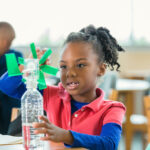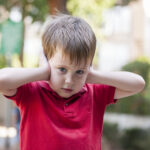Last Modified: July 19, 2023 | Published: February 17, 2023
As the long sunny summer days begin to wind down, you may be thinking about how your little one will do upon entrance to kindergarten. This can be an exciting yet intimidating time for parents.
To support you in this process, we have assembled the top ten skills to work on with your child.
The Top Ten Skills You Want Your Child to Know Before Entering Kindergarten
Social Skill # 1 Social Presence
Social presence in childhood is the willingness and ability of your child to be around other people. This important social skill is the very beginning of all social development.
A child who is having trouble with social presence is likely to hide under a desk in a classroom or become very stressed in a group of peers. Parents and teachers can help by gradually introducing the child to social situations and reminding them that they are safe and allowed to take a break when they need one.
Social Skill #2 Parallel Play
Parallel play in childhood is the skill of playing next to other children. An example is when two children play blocks near each other, but not together.
When a child is a toddler or preschooler, parallel play is a good sign. This play indicates healthy social development. The next step in social development would be to comment on the other child’s blocks or build a block tower together.
In this way, parallel play provides a foundation for other play skills, such as reciprocal interaction, sharing, humor, and developing friendships.
Social Skill #3 Social Motivation
Social motivation in childhood is the desire to connect with others and form friendships. You want to see that your child has the desire to connect with other children and enjoys being with and engaging with other children.
Social Skill #4 Positive Interactions with Peers
You want to see your child be able to share, take turns, and engage socially with peers. Interacting is an early play skill and does not require language. For example, children can interact by taking turns on the swings, sharing a slide on the playground, or playing tag.
Social Skill #5 Reciprocal Communication
Reciprocal communication refers to the back-and-forth of conversations. A child can make comments, ask questions, and comment on a topic being discussed.
You want to see your child be able to share their interests and show that they care about what others are saying. Reciprocal communication is a skill that may begin in preschool or kindergarten but will become more advanced as your child matures.
Social Skill #6 Pragmatic Language
Pragmatic language in childhood is social language. These skills include polite greetings, sharing information, asking questions of others, and engaging with them in conversation.
In typical child development, children learn to communicate with others somewhat naturally. Children learn to chat back and forth about a topic. They show delight in each other’s ideas with facial expressions and body language. They share information, ask questions of one another, and read nonverbal communication cues from peers.
Pragmatic language is an advanced skill. Do not expect that your rising kindergartener will be an expert. Instead, work with them and praise their efforts in this regard. For more on how to practice this skill with your child, see this video by Dr. Anna Kroncke, child psychologist.
Social Skill #7 Empathy
Empathy in childhood is the ability of your child to understand the emotions of other people. Your child can understand the emotion of another. Your child can be curious about their peers’ thoughts, ideas, and perspectives even if they differ from their own experience.
Readiness Skill #8 Focused Attention
Focused attention in childhood is when your child can stay focused on a task or activity despite other distractions in the environment. The ability to focus is a necessary skill for students.
Rising kindergarteners frequently will have some challenges with focused attention. Although this is completely normal, strategies are provided in this focused attention article to promote your child’s development.
Readiness Skill #9 Following Directions
Following directions in childhood is the ability for your child to listen and follow instructions from an authority figure. Children in kindergarten and beyond will need to learn how to follow classroom instructions. Kindergarteners will need to be able to line up for recess, sit in a group, and use class materials appropriately.
Some children learn how to follow directions fairly well during the toddler and preschool years. If your child is struggling to follow directions, there are a lot of methods in this article you try to help your child prepare for a successful kindergarten transition.
Readiness Skill #10 Transition Skills
Transition skills in childhood are your child’s abilities to navigate change in their environment. Your child needs to be able to transition smoothly from one activity to the next. Consistent skills are not expected of kindergarteners. This skill may develop on its own, or parents and teachers may need to give some support. Children who are especially passionate about a certain topic or activity may have a hard time transitioning. Some challenges are normal. But, if your child is having difficulties, see this transition skills article for ideas.
Get Help Here
Good job taking the time to understand the skills your child will need for kindergarten. Parenting is tough, especially during big transitions like these!
If you are concerned about your child developing some of these skills, take heart. These important social skills can be taught to children with promising outcomes. Check out our app and resource library to get the help you need today.


